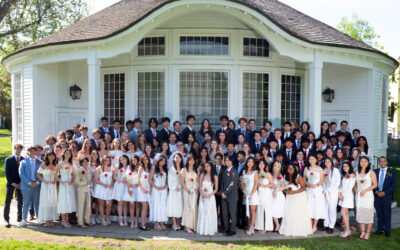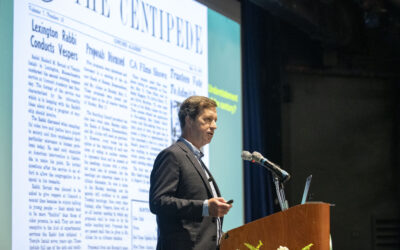
It’s 10 minutes before practice. I ought to be strolling out to the quad to greet the cross-country team, but instead I’m racing through the SHAC looking for paper, lots of paper — enough paper to illustrate a principle that’s near and dear to my heart: the principle of patience in training to be a distance runner.
I plan to hold up a sheet of paper and say, “One day of training is like a single sheet of paper,” and then I’ll rip the paper easily. Next, I’ll hold up a thick stack of papers and say, “100 days of training will transform you, just as hundreds of pages transform paper into a strong and resilient material,” and I’ll show how it’s impossible to rip the stack of paper.
But there’s a problem — I’ve just realized I forgot my stack of paper at home that morning — and now I have only a few minutes to find a replacement. In a panic, I run down to where Reid Young and Mike Bouzan have their offices. Neither is there, but I see a stack of sports apparel catalogs outside Mike’s office with a note that reads: “Please return when done.” I’m saved! I grab a good, thick catalog and rush back out to the quad to meet the team.
A few minutes later it’s all going as planned. When I demonstrate that I can’t rip the catalog, I can sense that my students have truly grasped the importance of patience.
At that moment, one student asks to see the catalog and, without thinking, I hand it over. I watch, first with bemusement then with horror, as he grasps it with both hands, takes a deep breath, and begins twisting and tearing at it. I tell him to stop the carnage, but it’s like trying to tell a lion to abandon its kill. As the pages give way and the other kids cheer, I realize something: I am not returning this catalog to Mike when done.
I tell this story to prepare myself for another season.
Welcome to Convocation!
Today we are called together to begin the work of re-creating the CA community based on the mission and values we’ve inherited from all those who have sat in the Chapel before us. Whether this is your first CA Convocation or your 31st, you’ve answered the call and you’re here to make your own unique contribution. I’m very fortunate and extremely grateful to have all of you as companions for the work ahead.
We’ll make a few mistakes along the way, I’m sure. I’ve made and continue to make plenty. One, obviously, was underestimating the resourcefulness and determination of CA students. But another, more serious, mistake was thinking that I could teach patience quickly. Patience, it turns out, must be learned slowly.
Perhaps it sounds strange coming from someone who wears a stopwatch every day, but I’m rather fond of the word “slowly.” A runner acquires endurance slowly. Injuries heal slowly. And I’ve always felt that traveling slowly in the right direction beats traveling quickly in the wrong direction every time. I think something similar is true for education: learning important stuff slowly beats learning unimportant stuff quickly every time.
So I want to speak today on behalf of learning slowly.
I think our culture tends to picture education as a steady climb, a progression from success to success, and an enterprise that, like running a race, rewards the speedy. In this optimistic view, any obstacles are temporary and easily overcome with the help of dedicated teachers and/or college counselors. After a decent number of years at this steady work, students emerge into the world with the knowledge, the skills, and the credentials to do something satisfying, meaningful, and ultimately marketable.
I want to be kind, here, but I also want to be truthful: It doesn’t always happen that way.
Education is often harder, and much less predictable, than how we imagine it. Obstacles are more serious, and you’ll need to solve many problems on your own. You might change course once, twice, or many times. You might feel like you’re falling behind. In short, your education might be difficult and slow.
But please, don’t mistake difficulty for failure. As author David Epstein writes in his book Range, “Frustration is not a sign that you are not learning, but ease is.” And difficulty is exactly the raw material you need to begin learning the really important stuff.
And what is the important stuff?
Your own struggles will help you learn — slowly — how to have kindness and compassion for others and their struggles. Seeing that everyone struggles, you’ll learn, I hope, to have compassion for yourself.
Your encounters with ideas and perspectives not your own will help you learn — slowly — how to listen. When you listen, you might hear things that make you sad or angry or uncomfortable, but hearing them will help you to grow. I was once told that to love is to listen. If you, like me, are inspired by the words of I Corinthians carved into the wood on the wall behind me, you might begin to put those words into practice by trying to listen more deeply.
Working with the brilliant and passionate teachers of this school will help you learn — slowly — about yourself. Your teachers will push and challenge you. They will encourage you to explore beyond what you thought were your limits. Not only will you begin gathering clues about where your own interests and passions lie, you’ll also develop the habit of exploration that will fuel your self-discovery long after you’ve left this school.
Learning about yourself might be the slowest learning of all. I think it was for me. I’d like to share a little of my own story as an example of just how slow slow learning can be.
Unlike my brothers and sisters who all excelled as scholars, I was a mediocre student in high school. I had a hard time studying and frequently neglected to turn in homework. Whatever academic abilities I had were dissipated by my poor work habits, leaving teachers shaking their heads in frustration.
What I really loved in high school was running. When I was running, I felt focused, confident, and at home with myself. As I became a better runner, I began learning the relationship between effort and improvement, and slowly became a better student.
When I graduated, I didn’t think I was ready for college, so I spent the next two years working at minimum-wage jobs, reading widely, and writing long letters to friends at school who were usually too busy to reply. All that reading and writing must have been helpful, because I did finally make it to college and even graduated with a combined degree in English and music. But it didn’t solve the problem of what I should do next.
Needing to support myself, I found a temporary job writing software manuals for a start-up company that was so disorganized and chaotic that for the first time in my life, I felt like the grown-up in the room. That job led to other jobs and a long career working in high tech. Interestingly, working with software engineers for so long helped develop skills that have proven very useful working with teenagers at CA.
Meanwhile, in my mid-20s I fell in love with running for the second time. Despite juggling a more-than-full-time job, a new family, and a mortgage, I began training seriously again. I had big dreams and ambitious goals; the most ambitious was to qualify for the U.S. Olympic Marathon Trials. I trained hard for many years, seven days a week, often twice a day, but in the end, it wasn’t enough, and I never reached my goal.
I only started to think about coaching much later when my daughter began running cross-country in high school. Seeing how much joy it brought her to run and compete with her team inspired me to volunteer for the boys’ team at her school, and the next season I was hired as assistant coach. I loved many things about coaching but grew steadily more disillusioned with what I felt was the school’s focus on winning with a few strong runners, rather than helping everyone to improve. After five years, I quit, with no plans to continue.
In the summer of 2007, a running friend forwarded me an email advertising a coaching position at a small, private school in Concord. I wasn’t at all sure this was a good idea, but I ended up responding to the email, and then going in for interviews. As I talked to people at CA, I began to have the strong sense that this could be very different than my previous experience. A few weeks later I stood nervously on the quad facing a large group of confident-looking CA students who were there to meet their new cross-country coach.
While your paths will be, no doubt, very different than mine, they’ll most likely be long and complicated, with detours and dead ends along the way.
Don’t mistake difficulties for failure.
When I think about all the miles I ran chasing my Olympic dream and all the years I spent working in crazy high-tech companies on soon-to-be-obsolete products, it seems like a lot of work with little to show for it. But I never stopped learning about myself — a slow process that ultimately led to my work at CA, to coaching a sport I love, and to spending the best part of every day with students and colleagues who inspire me. Now, if I were offered the choice of running in the Olympics, inventing the next iPhone, or having the opportunity to coach at CA, I would choose the absolute coolest thing I could think of: I would choose coaching at CA.
When you leave this Chapel in a few minutes you’ll step out into a world that’s moving very fast. You’ll have a hundred things to think about, and dozens of alerts on your phone all demanding your immediate attention. I understand why you might want to hurry to the next thing, and the next, and the next, and never slow down until you graduate.
But for just a moment before you go, I invite you to pause and consider that the most important learning you’ll do here can only happen slowly. Let’s try to help each other respect slow learning and the process of figuring out what it is we love, how to pursue it, and how to share it with others — and if it’s not asking too much, let’s try to do that with kindness, compassion, and perhaps even a little patience.
Thank you!


